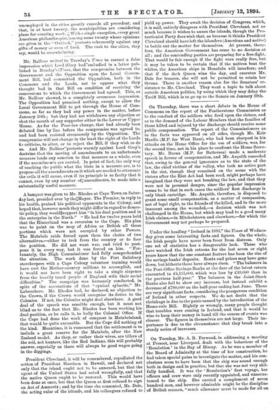A banquet was given to Mr. Rhodes at Cape Town
on Satur- day last, presided over by the:Mayor. The Premier, in reply to his health, praised his political opponents in the Colony, and hoped that, however much they might differ in regard to domes- tic policy, they wouldfsupport him "in his dual position and in the enterprise in the North." "He bad for twelve years held that the Hinterland was a reversion to the Cape. His plan was to paint on the map of Africa as British all those portions which were not occupied by other Powers. The Matabele raids forced upon them the choice of two alternatives,—either to trek from the country or to face the position. He did not want war, and tried to post- pone it in every way, but it was forced on him. "For- tunately, the High Commissioner had fully comprehended the situation. The work done by the Fort Salisbury storekeepers with a Cape Colony volunteer training would have cost the Mother-country millions to accomplish, and it would not have been right to take a single sixpence from the heavily taxed people of England with their social difficulties." The campaign was humanely conducted, in spite of the accusations of that "cynical sybarite," Mr. Labouchere. Mr. Rhodes had, he declared, no objection to the Crown, if the Crown would recognise its duties to the Colonies. If not, the Colonies might deal elsewhere. A good deal of the speech was sensible enough, but it must not blind us to the fact that Mr. Rhodes has been working his dual position, as he calls it, to bully the Colonial Office. If the Cape had done the work of conquest in Matabeleland, that would be quite excusable. But the Cape did nothing of the kind. Meantime, it is rumoured that the settlement is to include a great reserve for the Matabele, after the New Zealand model. As they, or rather their wives, are tillers of the soil, not hunters, like the Red Indians, this will probably answer, especially as there will always be good wages going in the diggings.






































 Previous page
Previous page